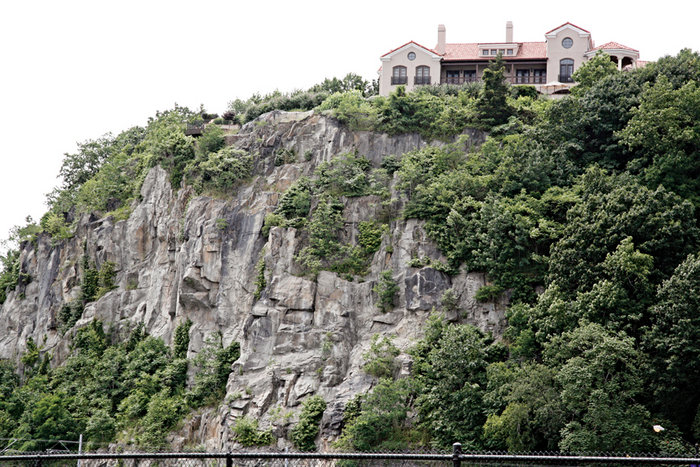“The Palisades were around long before we were,” Union City Mayor and State Sen. Brian Stack said last week about the 200-million-year-old stretch of cliffs that run through Hudson to Bergen counties. “They should not be further destroyed in exchange for commercial development or profit.”
Stack has sponsored the “Save the Hudson River Palisades Act” bill which, if passed, would prohibit any proposed development that would cut into the cliff slope or base. It would also prohibit development within a buffer area to be determined by the Palisades Interstate Park Commission in consultation with the Department of Environmental Protection.
Several recent development projects in North Bergen and beyond have aroused opposition from local activists who want to protect the Palisades. However, the projects are sometimes favored by towns that want additional tax dollars from the developments.
The stone cliffs run 20 miles from Jersey City to Nyack, N.Y. and hit 300 feet in Weehawken.
____________
“The effort to preserve the Palisades goes way back to the 1970s, and there is a lot of interest in the development of the area,” Stack explained. “I have always been a supporter of the effort. We simply cannot afford any further deterioration.”
He added that, optimistically, the bill could be up for consideration by the Senate Budget and Appropriations Committee by June 30.
Hills with history
The stone cliffs run 20 miles from Jersey City to Nyack, N.Y. and hit 300 feet in height in Weehawken, increasing to 540 feet at their northernmost point. They are already preserved in Fort Lee as they make up Palisades Interstate Park and are considered a national landmark there.
The cliffs were seen by millions of immigrants who arrived at Ellis Island a century ago. The word “palisade” has the word “pale” at its root, which is derived from the Latin word palus (stake).
In a June 18 press release, Stack said, “We will never be able to restore them to their natural state, or to re-establish the stability and security of the cliff slopes.”
According to the proposed bill, area development has caused the need for “the installation of steel nets in some areas…to protect against and prevent rockslides, [and] that further destruction and damage…could endanger the safety of the people and structures in these communities.”
Preservation: current and future
Union City’s Land Development Ordinance already has a built-in protection clause for the section of the Palisades that lies in the city called the Palisades Preservation Overlay District. It controls development within the steep slope areas along the Palisades and is meant to minimize the “adverse impact cause by the development of such areas, including, but not limited to, erosion, siltation, flooding, and surface water runoff.”
Stack’s bill is essentially a more specific and further-reaching version of the city’s ordinance, and goes so far as to stipulate so-called “buffer areas” that extend no more than 50 or less than 25 feet at the cliff slope edge, and no more than 100 or less than 50 feet at the cliff base.
The only exception to these preservation restrictions is for “linear development,” defined by the bill as community infrastructure needs such as is absolutely required for local living utilities like water pipelines, electrical, telephone, and other transmission lines. It excludes “residential, commercial, office, [and] industrial development.”
Wong believes the bill is a good start, but that it needs further clarification where Palisades Interstate Park Commision’s role in enforcing the bill and the concept of “linear development” are concerned.
“The most glaring exception to this bill is when the cliffs are destroyed in a development that is designated as a ‘redevelopment’ where all existing state and local zoning codes and building codes are subservient to the decisions and purposes of the redevelopment,” she said. “ Those decisions are made by the town commissioners and mayor normally as members of a specially created “Redevelopment Agency”. This bill does not cover designated redevelopment projects.”
She hopes these concerns can be resolved with Senator Stack and his staff.
What’s in store for those who oppose
The bill would allow the Palisades Interstate Park Commission to enforce severe penalties for those who attempt to further compromise the cliffs. Any violation would be treated as a fourth degree crime. Those in violation would face up to 18 months in prison and up to $10,000 in fines, in addition to a civil penalty between $500 and $1,000 for each offense. The perpetrator may also risk having his or her professional license suspended or even revoked in the state.
Gennarose Pope may be reached at gpope@hudsonreporter.com
